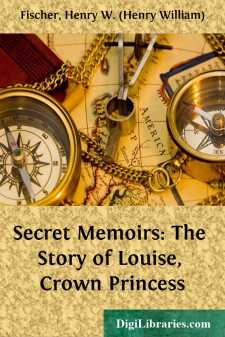Categories
- Antiques & Collectibles 13
- Architecture 36
- Art 48
- Bibles 22
- Biography & Autobiography 813
- Body, Mind & Spirit 142
- Business & Economics 28
- Children's Books 14
- Children's Fiction 11
- Computers 4
- Cooking 94
- Crafts & Hobbies 4
- Drama 346
- Education 46
- Family & Relationships 57
- Fiction 11829
- Games 19
- Gardening 17
- Health & Fitness 34
- History 1377
- House & Home 1
- Humor 147
- Juvenile Fiction 1873
- Juvenile Nonfiction 202
- Language Arts & Disciplines 88
- Law 16
- Literary Collections 686
- Literary Criticism 179
- Mathematics 13
- Medical 41
- Music 40
- Nature 179
- Non-Classifiable 1768
- Performing Arts 7
- Periodicals 1453
- Philosophy 64
- Photography 2
- Poetry 896
- Political Science 203
- Psychology 42
- Reference 154
- Religion 513
- Science 126
- Self-Help 84
- Social Science 81
- Sports & Recreation 34
- Study Aids 3
- Technology & Engineering 59
- Transportation 23
- Travel 463
- True Crime 29
Secret Memoirs: The Story of Louise, Crown Princess
Categories:
Description:
Excerpt
Of Memoirs that are truly faithful records of royal lives, we have a few; the late Queen Victoria led the small number of crowned autobiographists only to discourage the reading of self-satisfied royal ego-portrayals forever, but in the Story of Louise of Saxony we have the main life epoch of a Cyprian Royal, who had no inducement to say anything false and is not afraid to say anything true.
For the Saxon Louise wrote not to guide the hand of future official historiographers, or to make virtue distasteful to some sixty odd grand-children, bored to death by the recital of the late "Mrs. John Brown's" sublime goodness:—Louise wrote for her own amusement, even as Pepys did when he diarized the peccadilloes of the Second Charles' English and French "hures" (which is the estimate these ladies put upon themselves).
The ex-Crown Princess of Saxony suffered much in her youth by a narrow-minded, bigoted mother, a Sadist like the monstrous Torquemada; marriage, she imagined, spelled a rich husband, more lover than master; freedom from tyranny, paltry surroundings, interference. To her untutored mind, life at the Saxon Court meant right royal splendor, liberty to do as one pleases, the companionship of agreeable, amusing and ready-to-serve friends.
The Sad Saxon Court
Her experience? Instead of the Imperial mother who took delight in cutting her children's faces with diamonds and exposing her daughters to the foul machinations of worthless teachers—she acquired a father-in-law (Prince, afterwards King George) whose pretended affection was but a share of his all-encompassing hatred, whose breath was a serpent's, whose veins were flowing with gall; the supposed chevaleresque husband turned out a walking dictionary of petty indecencies and gross vulgarities when in a favorable mood, a brawler at other times, a coward always.
As to money—Louise wished for nothing better "than to be an American multi-millionaire's daughter for a week"! Amusements were few and frowned upon.
Liberty? None outside of a general permit to eat, drink and couple like animals in pasture, was recognized or tolerated. Nor could the royal young woman make friends. Her relatives-by-marriage were mostly freaks, and all were unbearable; her entourage a collection of spies and flunkeys.
If charity-bazaars, pious palaver, and orphaned babies' diapers had not been the sole topic of conversation at court; if there had been intellectual enjoyment of any kind, Louise might never have taken up her pen. As it was: "This Diary is intended to contain my innermost thoughts, my ambitions, my promises for the future, Myself. * * * These pages are my Father-Confessor. I confess to myself. * * * And as I start in writing letters to myself, it occurs to me that my worse self may be corresponding with my better self, or vice-versa."
At any rate she thinks "this Diary business will be quite amusing."
Louise's Amusing Writings
It is. The world always laughs at the—husband of a woman whose history isn't one long yawn.
Nor is Louise content with a bust picture. She gives full length portraits of herself, family, friends, enemies, and lovers, which latter she picks hap-hazard among commoners and the nobility. Only one of them was a prince of the blood, and he promptly proved the most false and dishonorable of the lot.
When Louise's pen-pictures do not deal with her amororos, they focus invariably emperors and princes, kings and queens,—contemporary personages whose acquaintance, by way of the newspapers and magazines, we all enjoy to the full, as "stern rulers," "sacrificers to the public weal," "martyrs of duty," "indefatigable workers," "examples of abstinence," and "high-mindedness"—everything calculated to make life a burden to the ordinary mortal.
Kings in Fiction and in Reality
But kings and emperors, we are told by these distant observers, are built that way; they would not be happy unless they made themselves unhappy for their people's sake....


